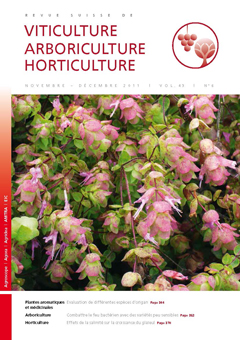
Issue 6 - November - December 2011
Abstract in open access
Five origan (Origanum sp.) species and varieties originating from several Mediterranean areas were assessed in Switzerland in 2010. These taxons could be an alternative to the commercial varieties essentially based on the species O. vulgare and O. onites. The two major chemical components for all the tested species were carvacrol and/or thymol. Only two varieties, O. syriacum var. syriacum and var. bevanii, presented a yield potential in dry aerial parts close to this of the commercial varieties. Finally, only O. syriacum var. syriacum stood out thanks to its very good essential oil content of 7 %.
Keywords: Origanum, essential oil, carvacrol, thymol
E-Mail: xavier.simonnet@acw.admin.ch
Adress:
Abstract in open access
The loss of traditional apple orchards, also due to fire blight outbreaks, is threatening the supply of the Swiss cider industry in high quality cider apples. Fireblight tolerant varieties are a key-factor in a sustainable disease-management. They not only ensure the availability of high quality cider apples, but also help to maintain traditional orchards, playing an important role with respect to landscape and ecology. In the market liberalization context, high juice quality and short transport distances are trump cards for the Swiss cider industry in facing competitors. The Research Station Agroscope Changins- Wädenswil ACW in collaboration with the Centralgenossenschaft für Alkoholfreie Verwertung von Schweizer Obstprodukten CAVO and other partners tested traditional and new apple varieties for their susceptibility to fireblight, juice quality, processing ability, as well as growing habit and productivity. From 2008 to 2011 about hundred apple varieties were tested for fireblight susceptibility by shoot inoculation, whereof ten additionally by bloom inoculation. In total fifty promising varieties have been tested for their processing ability and chemical as well as sensory juice quality. Out of all the varieties tested, seventeen fulfilled the high requirements for juice quality, while showing low susceptibility to fire blight.
Keywords: Erwinia amylovora, fire blight, cider apples, apple juice, traditional orchards
E-Mail: simon.egger@acw.admin.ch
Adress: INRAE, UMR LAE, 68000 Colmar
Abstract in open access
Polyphenols are the most abundant natural antioxidants in our diet. They are mainly provided by fruits and vegetables, tea, coffee and wine. Fruit content and composition in polyphenols may vary depending on different internal and external factors (genetic, soil and climate, fruit physiology, crop management, transformations). This paper aims to present these sources of variability by focusing on transformation impacts.
Keywords: polyphenols, fruit, process, transformation, nutritional quality
E-Mail: e.mehinagic@groupe-esa.com
Adress: Ecole supérieure d'agriculture d'Angers ESA, F-49007 Angers Cedex 01
Abstract in open access
Agroscope Changins- Wädenswil ACW carried out a selection program to optimize quality and yield of thyme (Thymus vulgaris L.) varieties, obtaining 56 new hybrids by crossing male sterile with male fertile clones. The most interesting one, named 'Varico 3', is characterized by high homogeneity, thymol chemotype, high essential oil content (5 %), same dry matter production as 'Varico2', the variety currently cultivated in Switzerland. 'Varico 3' was compared over three years (2007-2009) in plain and mountain to other thyme varieties from Switzerland, Germany and France. The influence of the number of glands (trichomes) and of harvest period on the essential oil contents was estimated. The peak production of essential oil takes place in the morning, and maximal concentration in essential oil for the second harvest is between July 20th and August 20th for the studied year. The excellent correlation between trichomes density and essential oil content of the leaves offers opportunities for hybrid selection at seedling stage. An application for variety protection was filed for 'Varico 3', now recommended to producers in Switzerland and Central Europe interested in a thymol-rich thyme.
Keywords: Lamiaceae, aromatic plants, trichome, essential oil
E-Mail: jose.vouillamoz@acw.admin.ch
Adress:
Abstract in open access
Two gladiolus cultivars «Chinon» and «Ben Venuto», were cultivated under glasshouse at 25 ± 2 °C. Sprinkling of plants was realized with running tap water added or not (control) with different NaCl doses: 50, 100 and 150 mM. Vegetative growth, flowering and development of new bulbs were clearly affected by salinity level of sprinkling solution. The relative decrease of length and number of leaves in presence of NaCl 150 mM varied from 12 to 29 %, while fresh weight and circumference of new bulbs decreased from 29 to 64 %. Growth of aerial and underground vegetative parts, flower production and relative tolerance to salinity were less affected by cultivar «Chinon».
Keywords: vegetative growth, flowering, bulbing, gladiolus, salinity
E-Mail: faouzi.haouala@laposte.net
Adress:
Abstract in open access
≤
Keywords:
E-Mail:
Adress:

 Download of full issue
Download of full issue
 Download article
Download article